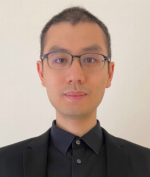广义部分耦合涡轮码
日期:2023/11/22
学术讲座: 广义部分耦合涡轮码
主讲人: Min Qiu
时间: 2023年11月22日(周三)上午9:00
地点: 密西根学院龙宾楼454会议室
讲座摘要
Current communication standards, i.e., 4G and 5G, adopt transport block (TB)-based transmission, where a block of data (or TB) consists of several code blocks (CBs). Since each CB is protected by an individual error correction code, the reliability of the whole TB depends on the individual CB. To improve the reliability, a longer channel code is required for each CB, which can increase the decoding complexity and latency considerably.
In this talk, we introduce partially information and partially parity coupled codes to address the above issues. The main idea is that consecutive codewords are coupled in a way that a fraction of information or parity bits from previous codewords become part of the information sequence of the current codeword. This class of codes have two appealing features. First, the code rate can be flexibly adjusted by varying the coupling ratio. Second, the component encoders and decoders can adopt those off-the-shelf. We start with introducing partially coupled turbo codes and show that they have decoding thresholds within 0.0002 to the binary erasure channel capacity from rates 1/3 to 9/10, yielding an attractive way for constructing capacity-approaching channel codes. Next, we introduce generalized spatially coupled parallel concatenated codes, which are proven to have threshold saturation and capacity-achieving properties. Note that this is the first class of turbo codes that are proven to be capacity-achieving. In addition, we generalize the idea of partial coupling to construct ultra-reliable coupled codes with component codes based on product codes for optical communication systems.
主讲人简介
 Min Qiu (Member, IEEE) received his Ph.D. degree in Electrical Engineering from the University of New South Wales (UNSW), Sydney, Australia, in 2019. He is now a Postdoctoral Research Associate with UNSW. His research interests include channel coding, information theory, and their applications on building reliable communication systems. He was honoured as the Exemplary Reviewer of the IEEE Transactions on Communications in 2018, 2019, 2021, and 2022, and the IEEE Communications Letters in 2021 and 2022. In addition, he received the Chinese Government Award for Outstanding Self-Financed Students Abroad, the Best Poster Award from Australia Communication Theory Workshop in 2019, and the Australia Awards-Endeavour Research Fellowship in 2018. He serves as the Technical Program Committee member for various conferences including IEEE International Conference on Communications (ICC).
Min Qiu (Member, IEEE) received his Ph.D. degree in Electrical Engineering from the University of New South Wales (UNSW), Sydney, Australia, in 2019. He is now a Postdoctoral Research Associate with UNSW. His research interests include channel coding, information theory, and their applications on building reliable communication systems. He was honoured as the Exemplary Reviewer of the IEEE Transactions on Communications in 2018, 2019, 2021, and 2022, and the IEEE Communications Letters in 2021 and 2022. In addition, he received the Chinese Government Award for Outstanding Self-Financed Students Abroad, the Best Poster Award from Australia Communication Theory Workshop in 2019, and the Australia Awards-Endeavour Research Fellowship in 2018. He serves as the Technical Program Committee member for various conferences including IEEE International Conference on Communications (ICC).
